|
|
лилия,lily,lilie,giglio,lirio
|

10.05.2012, 15:40
|
|
Администратор
|
|
Регистрация: 07.09.2010
Сообщений: 7,669
|
|
Огромная благодарность Marcela Capo за МК
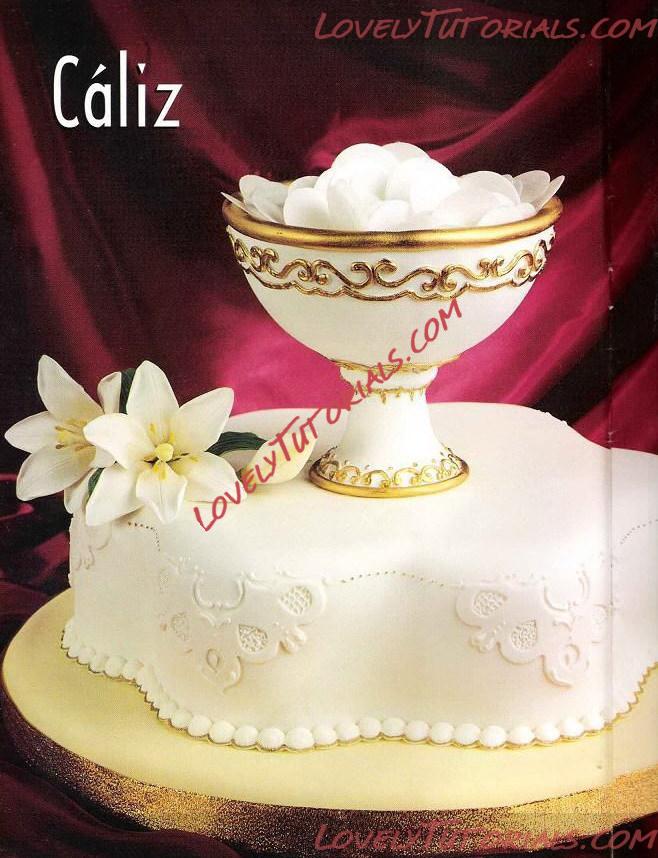
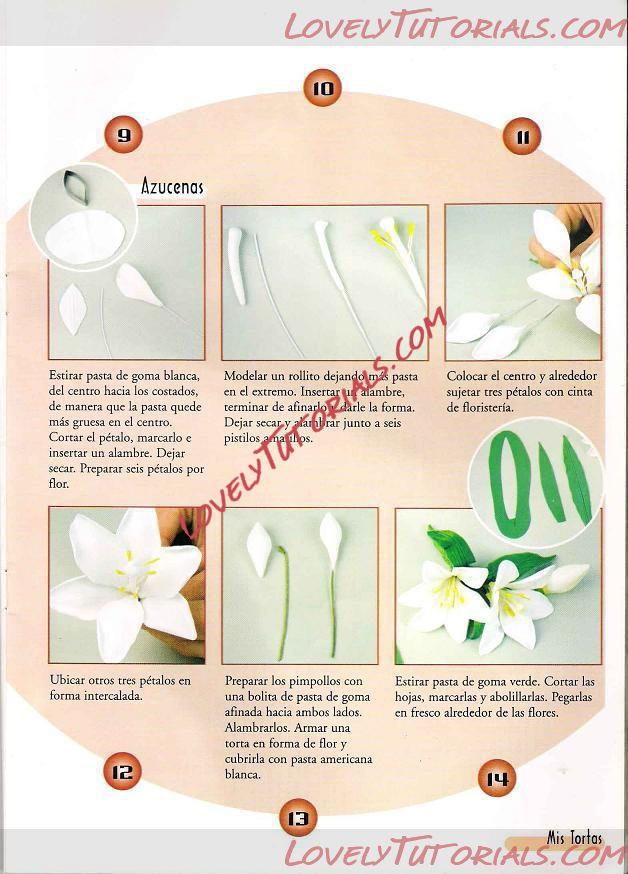
|

30.05.2012, 10:32
|
|
Администратор
|
|
Регистрация: 07.09.2010
Сообщений: 7,669
|
|
 как слепить Лилию
как слепить Лилию
|

30.05.2012, 10:44
|
|
Администратор
|
|
Регистрация: 07.09.2010
Сообщений: 7,669
|
|
|

16.08.2012, 07:17
|
|
Администратор
|
|
Регистрация: 07.09.2010
Сообщений: 7,669
|
|

Огромная благодарность Автору duskyroseveiners за Мастер-класс
Oriental Lily Tutorial
The method shown here is the same method for any of the lily veiner sets for sale in the shop. You just need to consider the sizes of the stamens/pistil you will need and the amount of paste you will use.
This particular set makes a lily approximately 5 1/4 inches in diameter.
What you will need:
Dusky Rose Oriental Lily veiners
Rolling Board
Paste of your choice
Apple or pear tray formers
White fat (trex) or Petal Base
Glue of choice
Small rolling pin & Orchard Pin
Cutting wheel
Craft knife
Dresden tool or similar
Paintbrush (fine)
Dusting brush
Wires 30g & 26g (white)
Cosmetic Sponge
Pollen of choice
White stem tape (half width)
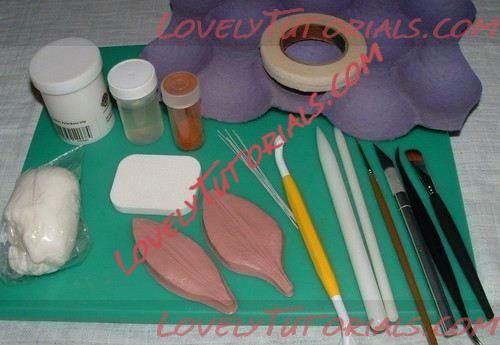
To make the stamens and the Pistil:
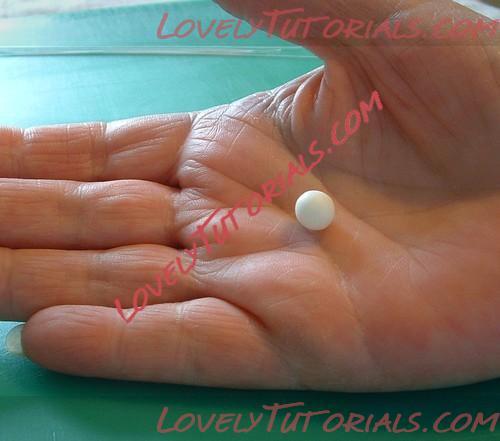 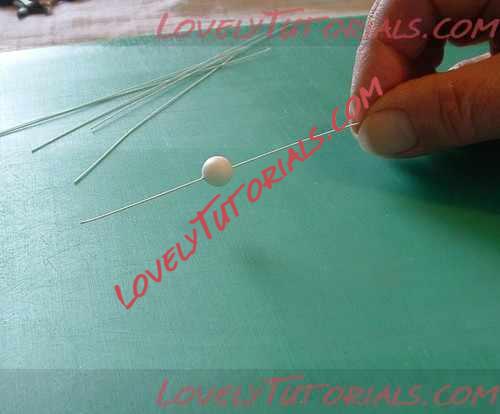 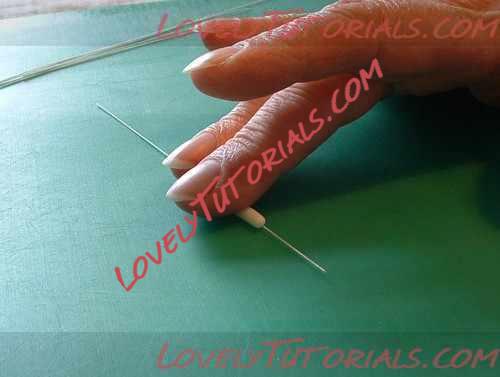 Take a garden pea sized piece of paste and thread half way down onto a 1/3 length piece of 30g white wire. From the centre of the wire roll with your fingers back and forth on the rolling board in the direction of one end(from right to left or left to right.....your choice)
You should attempt a tapered end and this should be the end you will attach the anther (pollen head). The stamen length should be approximately 2/3 the length of the petals on your chosen lily veiner.
Take a garden pea sized piece of paste and thread half way down onto a 1/3 length piece of 30g white wire. From the centre of the wire roll with your fingers back and forth on the rolling board in the direction of one end(from right to left or left to right.....your choice)
You should attempt a tapered end and this should be the end you will attach the anther (pollen head). The stamen length should be approximately 2/3 the length of the petals on your chosen lily veiner.
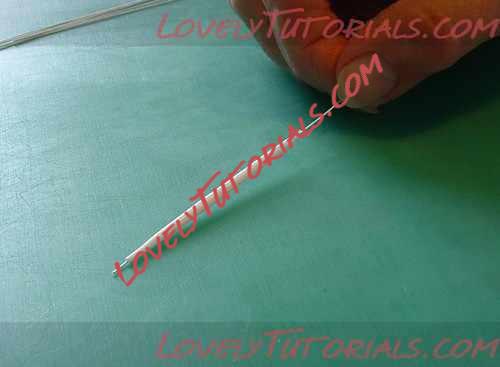 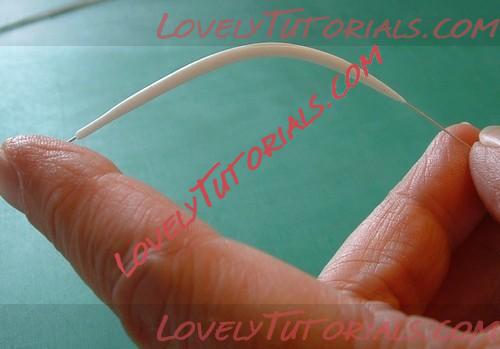 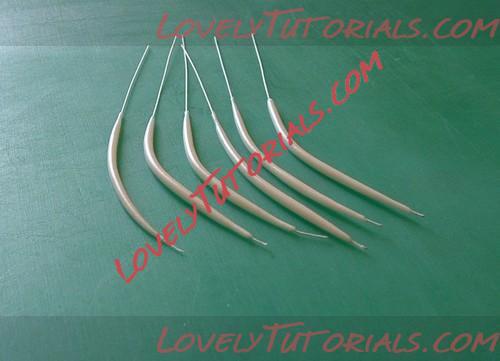 Stop rolling when you have left a little of the end of the wire exposed. Flex the wire so that it just bends into a gentle curve and leave to dry. You need six of these for each lily.
Stop rolling when you have left a little of the end of the wire exposed. Flex the wire so that it just bends into a gentle curve and leave to dry. You need six of these for each lily.
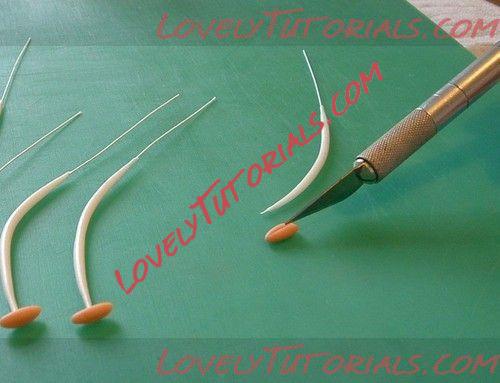 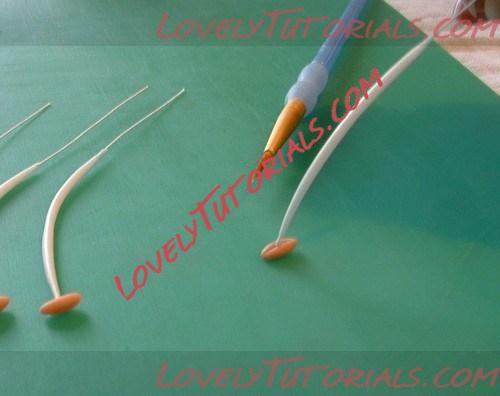 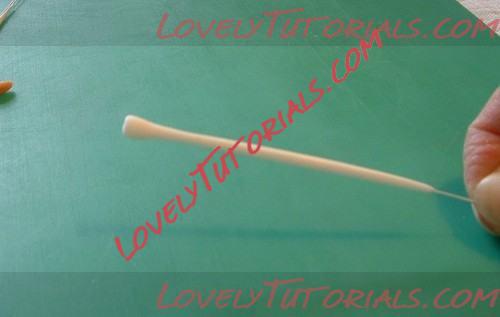 When the stamens are dry you can attach the anthers. The paste I have used here for these has been coloured with a terracotta dusting powder, but you could use any brown paste colour or dusting powder to achieve a similar colour. Take a piece of paste the size of a rice grain and taper it at both ends. Using your craft knife, make a cut into, but not through the centre of the paste. Trim the end of the bare wire on your stamen so that its just visible and moisten the end of that with egg white or the glue of your choice and push the end of the wire into the anther. The anther should be facing outwards, and can look like a T bar, or can be more vertical depending on the maturity of the flower.
The pistil is made very much in the same way as the stamens, by rolling a piece of paste along the wire, but instead of stopping short before the wire ends, the paste should extend over the end of the wire and be pinched to leave a small bulb. The pistil should be slightly longer than the stamens.
Using the dresden tool or something which will do the job, shape the bulbous end on the pistil into three equal segments
When the stamens are dry you can attach the anthers. The paste I have used here for these has been coloured with a terracotta dusting powder, but you could use any brown paste colour or dusting powder to achieve a similar colour. Take a piece of paste the size of a rice grain and taper it at both ends. Using your craft knife, make a cut into, but not through the centre of the paste. Trim the end of the bare wire on your stamen so that its just visible and moisten the end of that with egg white or the glue of your choice and push the end of the wire into the anther. The anther should be facing outwards, and can look like a T bar, or can be more vertical depending on the maturity of the flower.
The pistil is made very much in the same way as the stamens, by rolling a piece of paste along the wire, but instead of stopping short before the wire ends, the paste should extend over the end of the wire and be pinched to leave a small bulb. The pistil should be slightly longer than the stamens.
Using the dresden tool or something which will do the job, shape the bulbous end on the pistil into three equal segments
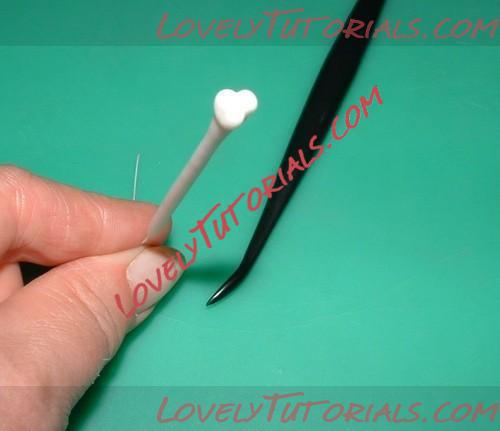 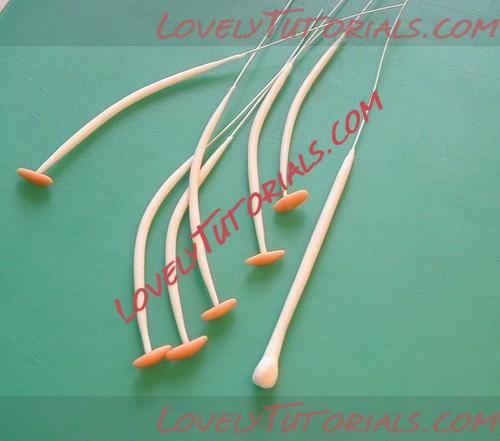 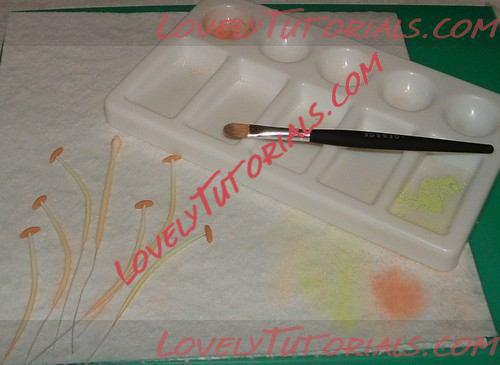 You should now have all the elements for the centre of your lily. For this flower I have dusted the stamens and the pistil column with a mixture of white and orchid white dusting powder, and have overdusted with a hint of terracotta mixed with white.
You should now have all the elements for the centre of your lily. For this flower I have dusted the stamens and the pistil column with a mixture of white and orchid white dusting powder, and have overdusted with a hint of terracotta mixed with white.
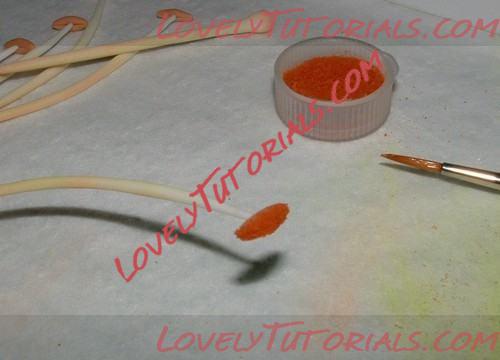 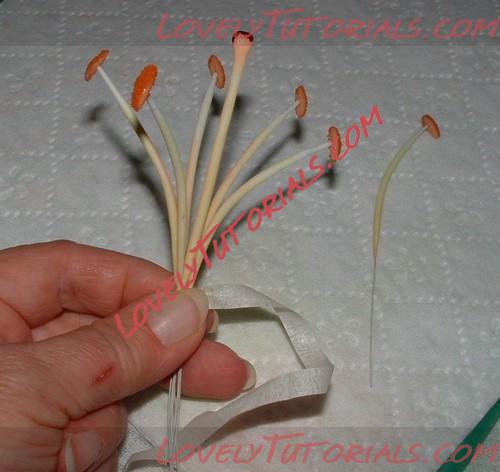 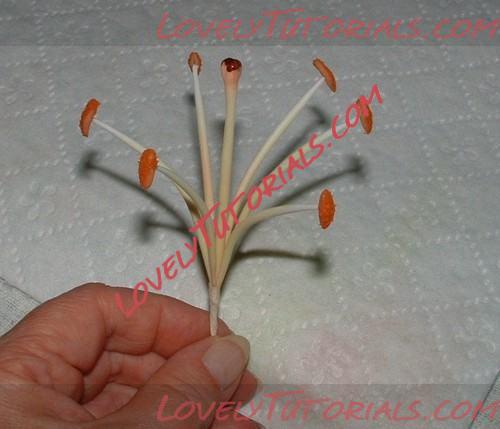 The pollen I have used here is dry polenta grains which have had terracotta and brown dusting powder added to them. Moisten just the flat side of the anther with your chosen glue and dip into the polenta. Leave to one side to dry off completely. The very tip of the pistil has been coloured with dark brown dusting powder mixed with IPA and finished off with a little confectioners glaze to give the appearance of nectar.
When they are all completely dry, tape the stamens equally and firmly around the pistil using half width white stem tape. Leave to one side until you are ready to assemble your flower.
Making the petals
The pollen I have used here is dry polenta grains which have had terracotta and brown dusting powder added to them. Moisten just the flat side of the anther with your chosen glue and dip into the polenta. Leave to one side to dry off completely. The very tip of the pistil has been coloured with dark brown dusting powder mixed with IPA and finished off with a little confectioners glaze to give the appearance of nectar.
When they are all completely dry, tape the stamens equally and firmly around the pistil using half width white stem tape. Leave to one side until you are ready to assemble your flower.
Making the petals
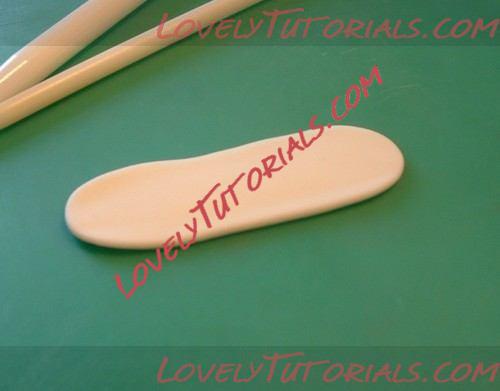 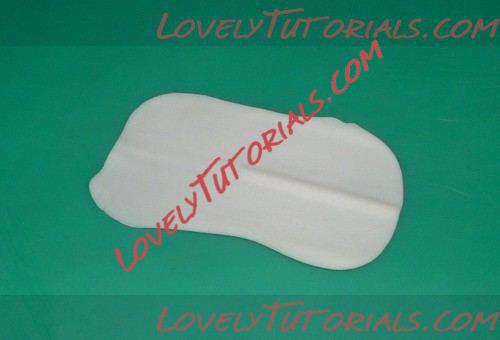 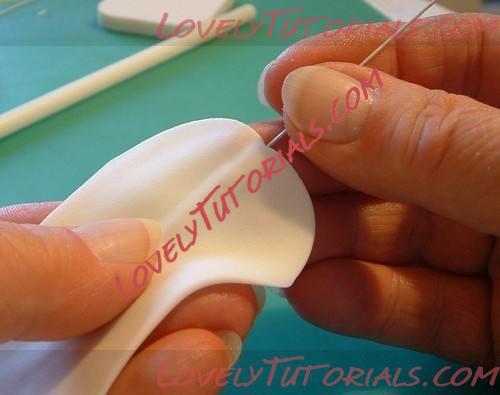 Your rolling board should be prepared with a very fine film of white fat or Petal base.
Take a piece of paste large enough to make your lily petal, roll into a sausage first and then with your small rolling pin to a depth of 2-3mm. Using the orchard pin, roll away the paste from the centre on both sides, leaving a central ridge in the middle of the paste. Roll away the top of the ridge, so that you are left with a piece of paste as shown in the centre photograph.
Take a piece of 1/3 length 26g moistened wire and thread the wire into the ridge left in the paste.
Your rolling board should be prepared with a very fine film of white fat or Petal base.
Take a piece of paste large enough to make your lily petal, roll into a sausage first and then with your small rolling pin to a depth of 2-3mm. Using the orchard pin, roll away the paste from the centre on both sides, leaving a central ridge in the middle of the paste. Roll away the top of the ridge, so that you are left with a piece of paste as shown in the centre photograph.
Take a piece of 1/3 length 26g moistened wire and thread the wire into the ridge left in the paste.
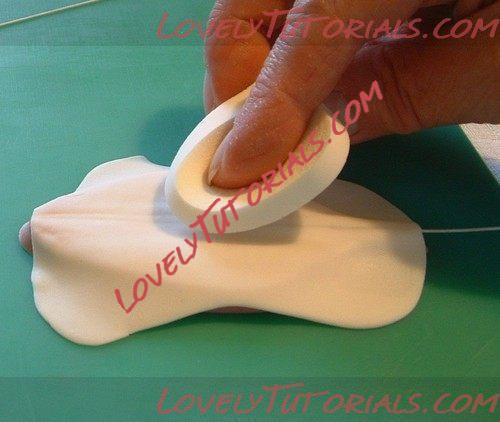 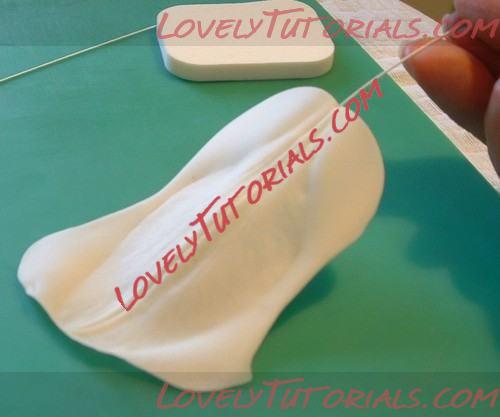 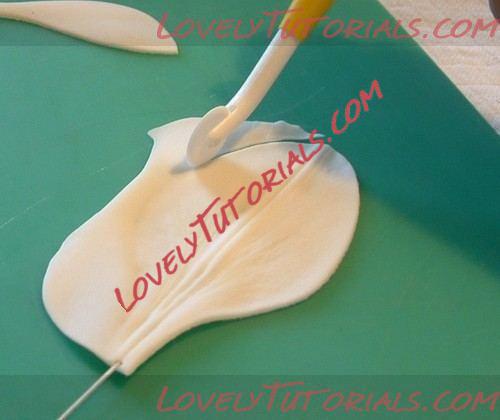 Place the paste over the veiner, lining up the wire with the centre of the veiner, and using the cosmetic sponge press the paste into the veiner. Lift the paste off the veiner and turn over. With your cutting wheel, cut out the impression left in the paste. Pinch the base of the petal to the wire.
Place the paste over the veiner, lining up the wire with the centre of the veiner, and using the cosmetic sponge press the paste into the veiner. Lift the paste off the veiner and turn over. With your cutting wheel, cut out the impression left in the paste. Pinch the base of the petal to the wire.
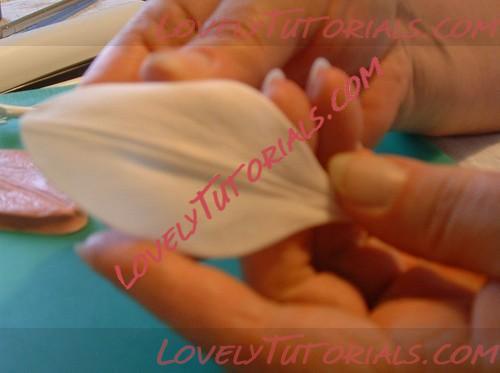 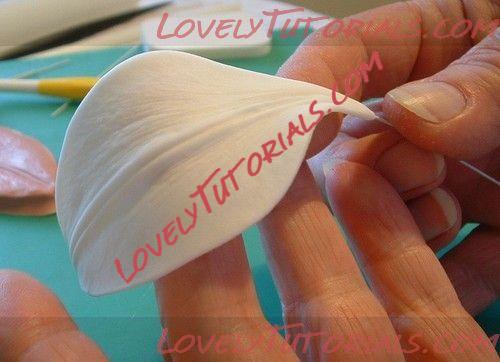 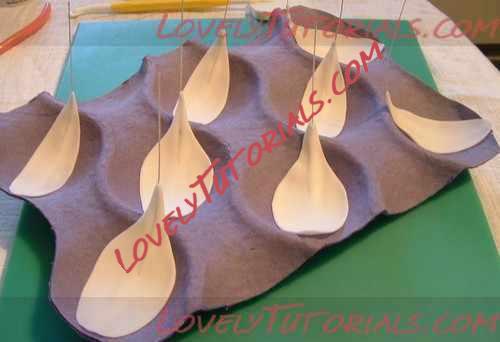 Most lilies are quite fleshy in appearance and these petals need no thinning or frilling, but you can get rid of the cut edge by gently touching over the edge of the petals with your thumb and forefinger as shown in the photograph above.
You need to make a very gentle curve in the petals before you set them in the former to dry, so you should place your thumb on the top of the petal and your forefinger underneath, and very gently, but firmly, you need to apply pressure to the wire in the petal. If you are too heavy handed the wire will poke through the paste.
You should make three outer and three inner petals for each lily and dry them as shown in the former of your choice. If you are not able to obtain apple/pear trays, you can dry the petals over the cardboard tubes found in the middle of kitchen rolls, or clingfilm etc. Its always a good idea to make a couple of spare petals too.
Assembling the lily
Most lilies are quite fleshy in appearance and these petals need no thinning or frilling, but you can get rid of the cut edge by gently touching over the edge of the petals with your thumb and forefinger as shown in the photograph above.
You need to make a very gentle curve in the petals before you set them in the former to dry, so you should place your thumb on the top of the petal and your forefinger underneath, and very gently, but firmly, you need to apply pressure to the wire in the petal. If you are too heavy handed the wire will poke through the paste.
You should make three outer and three inner petals for each lily and dry them as shown in the former of your choice. If you are not able to obtain apple/pear trays, you can dry the petals over the cardboard tubes found in the middle of kitchen rolls, or clingfilm etc. Its always a good idea to make a couple of spare petals too.
Assembling the lily
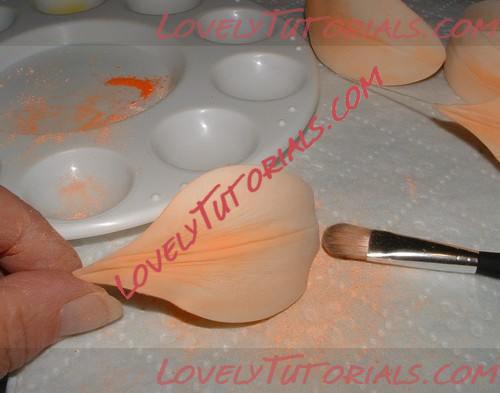 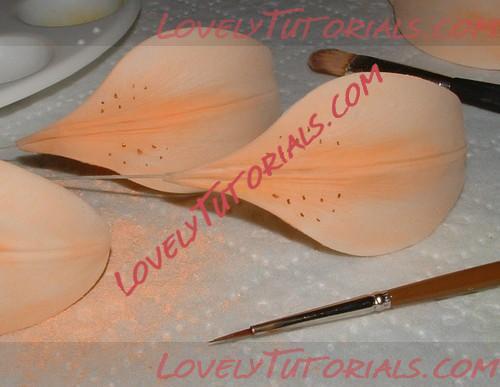 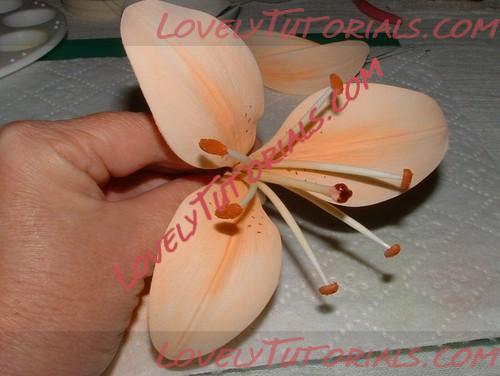 Once all your petals are dry you can colour them as you wish, and Oriental Lilies come in a multitude of colours!
I have chosen here to colour my lily simply, with a mixture of mandarin and white petal dust(mixed) The petals were first dusted with a very pale mix and extra depth of colour was dusted on to the centre base of each petal. The larger petals only have been gently spotted with brown petal dust mixed with IPA using a very fine paintbrush.
To assemble the lily, you should take the stamens you made earlier, and evenly tape the three largest petals around them using half width white stem tape. The three narrower petals should be taped in between/behind those.
Once you have finished your lily, you can pass it through the steam of a kettle to remove the dusty appearance, and set the colour.
Once all your petals are dry you can colour them as you wish, and Oriental Lilies come in a multitude of colours!
I have chosen here to colour my lily simply, with a mixture of mandarin and white petal dust(mixed) The petals were first dusted with a very pale mix and extra depth of colour was dusted on to the centre base of each petal. The larger petals only have been gently spotted with brown petal dust mixed with IPA using a very fine paintbrush.
To assemble the lily, you should take the stamens you made earlier, and evenly tape the three largest petals around them using half width white stem tape. The three narrower petals should be taped in between/behind those.
Once you have finished your lily, you can pass it through the steam of a kettle to remove the dusty appearance, and set the colour.
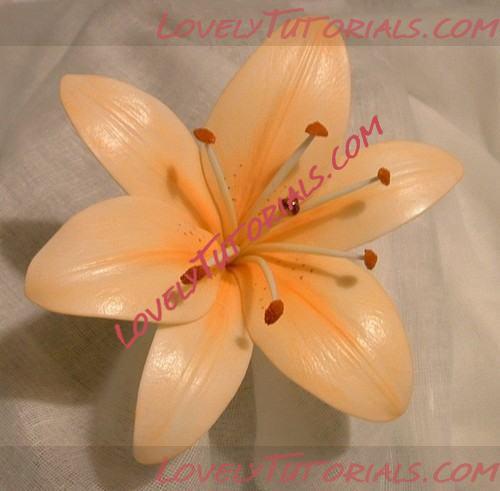
|

22.08.2012, 07:57
|
|
Администратор
|
|
Регистрация: 07.09.2010
Сообщений: 7,669
|
|
Огромная благодарность Автору Mirka за Мастер-класс
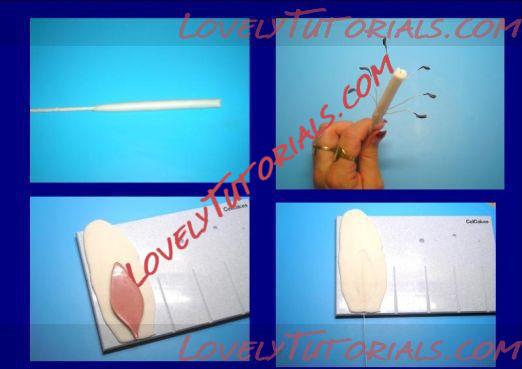
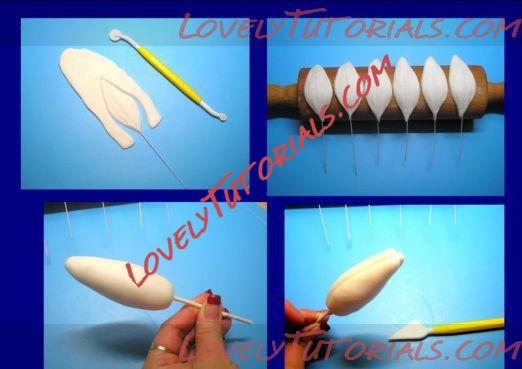
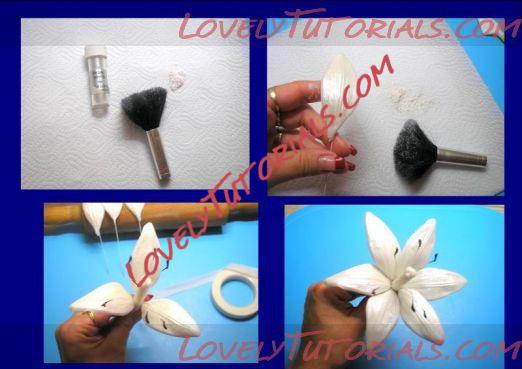
|

03.10.2012, 06:36
|
|
Администратор
|
|
Регистрация: 07.09.2010
Сообщений: 7,669
|
|
|
 |
|
|
Метки
|
artesanatos passo a passo, baking, blomster, blüten, blütenpaste, cake decorating, cake decorating techniques, cerâmica plástica, chiodi di garofano, clavo de olor, clous de girofle, cloves, cold porcelain, cold porcelain figurines, cold porcelain flowers, confeitando bolos, curso completo de flores, curso de modelado, decoracion de pasteles, decoración de tortas, decorare le torte, decorazioni, deko fondant, dekorace na dort, dekoracija, dekoracije, dekorasyon, dekorácie, fimo, fimo flowers, fiori, fleurs, flogistica, floral inspirations, flores, flores azucar, floristics, floristik, floristikk, floristique, florística, flower, flower paste, flowering plants, flowers, fondan, fondant, fondente, fotopostup, giglio, gum pasta, gum paste, gum paste flowers, gumpaste, hand painting, handmodelliert, how to, how-to's, hřebíček, jak na, kage dekoration, kagedekoration, kakebaking, krok za krokem, kvety, la modélisation, leaves, lilie, lily, lirio, making sugar flowers, marshmallow, masa flexible, modelado, modelagem, modelare, modeling, modeling paste, modeliranje, modellazione, modelleme, modellering, modellieren, modellierpaste, modelləşdirmə, modelovanie, modelování, modelowanie, motivtorten, nelken, pap, paso a paso, passo a passo, passo-a-passo, pasta flexible, pocelana fria, polymer clay, polymer clay flowers tutorial, postup klinček, postupak za ukrasavanje, schritt für schritt anleitung, schritt-für-schritt, sculpey flowers, sculpting, simple, steg for steg, step by step, step-by-step, styrofoam, sugar cane flowers, sugar cloves, sugar flower, sugar flowers, sugar flowers for cake decorating, sugarcraft, sugarpaste, sukker art, tecnicas de decoracion, tecniche, thai flowers, torte, torte decorate, torten dekorieren, torti, trin for trin, trin-for-trin, trinn for trinn, tutorial, tutorijal, ukrašavanje torti, uputstvo za dekoraciju, wedding cake, wedding cakes, zuckerblumen, ดอกไม้, सजा केक, मॉडलिंग, モデル, çiçek modelleme, 建模, 裝飾蛋糕, кветкі, квіти, как слепить лилию, куст, гвоздика, полимерная глина, пошагово, природа, мк, моделиране, майстер-класи, маршмеллоу, мастика, мастер-класс, букет, листья, лепим цветы, лепка, ліплення, растения, украшение тортов, украшение торта, свадебный торт, сахарная мастика, сахарный клей, уроки прикрашання, торт, фимо, флористика, флора, холодный фарфор, цветочная паста, цветя, цветы, цветы из полимерной глины, цветы из холодного фарфора, цветы на торт, шаг за шагом  |
|

